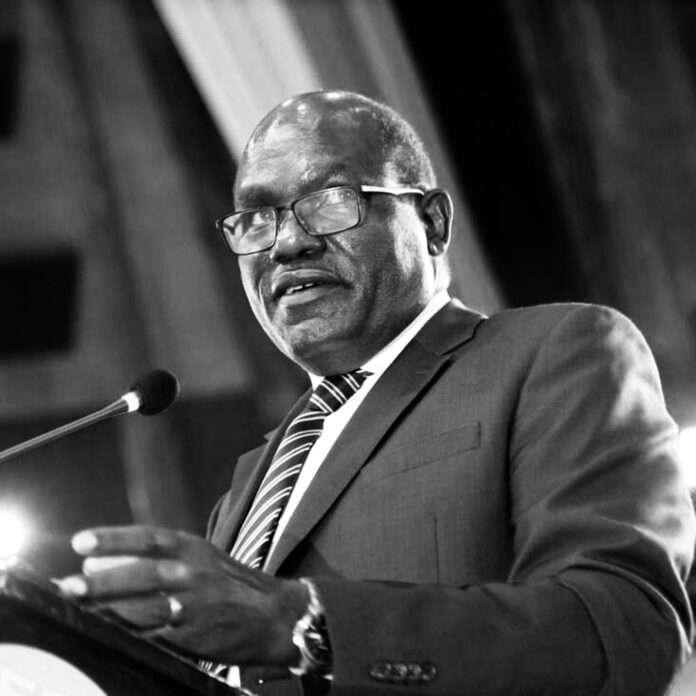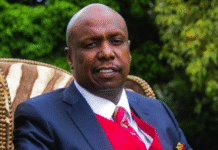Former Independent Electoral and Boundaries Commission (IEBC) Chairman Wafula Chebukati has passed away at the age of 64, leaving behind a complex legacy defined by electoral reforms, resilience, and polarizing controversies.
His family confirmed that Chebukati succumbed to cancer at 11 p.m. on February 19, 2025, while admitted in critical condition at Nairobi Hospital’s Intensive Care Unit (ICU).
Chebukati, who retired in January 2023 after a six-year tenure as IEBC chairman, oversaw two of Kenya’s most contentious general elections in 2017 and 2022.
His leadership was both lauded for its steadfastness and criticized amid allegations of irregularities, culminating in a dramatic fallout with four commissioners during the 2022 presidential election.
A Tenure of Reforms and Resilience
Appointed in 2016, Chebukati took the helm of the IEBC at a time when public trust in Kenya’s electoral processes was at a low ebb.
His major contributions included driving technological advancements to enhance transparency, such as the introduction of the Kenya Integrated Election Management System (KIEMS), which aimed to streamline voter registration and result transmission.
Under his watch, the IEBC also implemented stricter voter verification processes to curb electoral fraud, a persistent challenge in Kenyan politics.
The 2017 General Election, however, thrust Chebukati into the national spotlight. The presidential election was nullified by the Supreme Court following a petition by opposition leader Raila Odinga, who alleged widespread irregularities.
Chebukati presided over a chaotic rerun later that year, which Odinga boycotted, allowing incumbent Uhuru Kenyatta to secure a second term.
Despite the turmoil, Chebukati’s resolve to uphold the commission’s mandate earned him praise from some quarters as a symbol of independence in a deeply polarized nation.
The 2022 Election: Controversy and the Cherera Fallout
Chebukati’s tenure reached its crescendo during the 2022 General Election, a high-stakes contest between Raila Odinga and then-Deputy President William Ruto.
On August 15, 2022, Chebukati declared Ruto the winner with 50.49% of the vote, a razor-thin margin that sparked immediate controversy. The announcement was marred by an unprecedented rebellion within the IEBC itself.
Four commissioners—Juliana Cherera, Francis Wanderi, Irene Masit, and Justus Nyang’aya, collectively dubbed the “Cherera Four”—publicly disowned the results moments before Chebukati’s declaration at the Bomas of Kenya.
Citing a lack of transparency in the tallying process, they accused Chebukati of unilaterally altering figures to favor Ruto.
The dramatic walkout, broadcast live to a stunned nation, deepened public mistrust and fueled protests by Odinga’s supporters.
Chebukati stood his ground, insisting that the results were credible and that he had followed the law.
The Supreme Court later upheld Ruto’s victory in September 2022, dismissing Odinga’s petition and affirming Chebukati’s process, though questions lingered about the IEBC’s internal discord.
The Cherera Four faced legal and disciplinary action, with Cherera and two others resigning under pressure, while Masit was removed following a tribunal probe.
A Legacy of Division
Chebukati’s tenure was a paradox: a period of significant electoral modernization overshadowed by persistent allegations of bias and mismanagement.
Supporters argue that he navigated Kenya through turbulent political waters, ensuring stability in the face of immense pressure.
Critics, however, point to the unresolved tensions of 2017 and 2022 as evidence of systemic flaws he failed to address.
Chebukati’s death marks the end of an era for Kenya’s electoral politics. As the nation prepares for future elections, his contributions—and the controversies that defined his time at the IEBC—will remain a subject of debate.
He is survived by his wife and children, with funeral arrangements to be announced by the family.



















